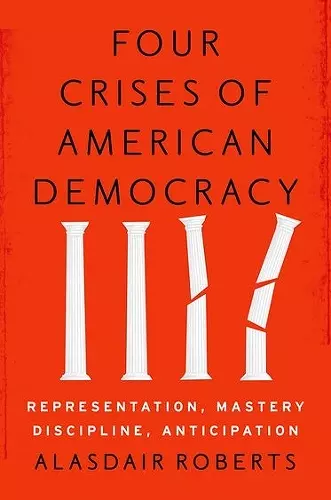Four Crises of American Democracy
Representation, Mastery, Discipline, Anticipation
Format:Hardback
Publisher:Oxford University Press Inc
Published:23rd Feb '17
Currently unavailable, and unfortunately no date known when it will be back

Since 2008, there has been a flood of literature worrying about the state of democracy in the United States and abroad. Observers complain that democratic institutions are captured by special interests, incompetent in delivering basic services, or overwhelmed by selfish voters. Lurking in the background is the global resurgence of authoritarianism, a wave bolstered by the Western democracies' apparent mishandling of the global financial crisis. In Four Crises of Democracy, Alasdair Roberts locates the recent bout of democratic malaise in the US in historical context. Malaise is a recurrent condition in American politics, but each bout can have distinctive characteristics. Roberts focuses on four "crises of democracy," explaining how they differed and how government evolved in response to each crisis. The "crisis of representation" occurred in the late nineteenth and early twentieth centuries, and was centered on the question of whether the people really controlled their government. This period was dominated by fears of plutocracy and debates about the rights of African Americans, women and immigrants. The "crisis of mastery" spanned the years 1917-1948, and was preoccupied with building administrative capabilities so that government could improve its control of economic and international affairs. The "crisis of discipline," beginning in the 1970s, was triggered by the perception that voters and special interests were overloading governments with unreasonable demands. In the final part of his analysis, Roberts asks whether the United States is entering a "crisis of anticipation," in which the question is whether democracies can handle long-term problems like global warming effectively. Democratic institutions are often said to be rigid and slow to change in response to new circumstances. But Roberts suggests that history shows otherwise. Preceding crises have always produced substantial changes in the architecture of American government. The essential features of the democratic model-societal openness, decentralization, and pragmatism-give it the edge over authoritarian alternatives. A powerful account of how successive crises have shaped American democracy, Four Crises of Democracy will be essential reading for anyone interested in the forces driving the current democratic malaise in the US and throughout the world.
"Already among our foremost observers of global capitalism, economic policymaking, and the information age, Alasdair Roberts in his latest book expertly details four periods of crisis of American democracy across the past hundred-plus years. The reassuring news: the parlous state of our current national politics has ample historical precedent-and the republic survives. The better news: each crisis period contained the seeds of democratic renewal, providing genuine hope for our own future. Roberts's clarion voice is one that deserves a full hearing from U.S. officialdom and citizenry alike."- Rogan Kersh, Provost and Professor of Politics & International Affairs, Wake Forest University "In this sharp and insightful analysis, Roberts takes dead aim at a central puzzle of our time: is American democracy so sick that it risks sliding deeply into chaos, even oblivion? The book takes measured stock of the challenges democracy faces. But even more important, Roberts finds that democracy has faced big crises before and has found within itself what it takes to conquer them. The result is an exceptionally clear-eyed look at the issues we face and how we can solve them. It's must reading-especially for those trapped in despair about our system of government."-Donald F. Kettl, Professor of Public Policy, University of Maryland
ISBN: 9780190459895
Dimensions: 213mm x 142mm x 33mm
Weight: 408g
280 pages